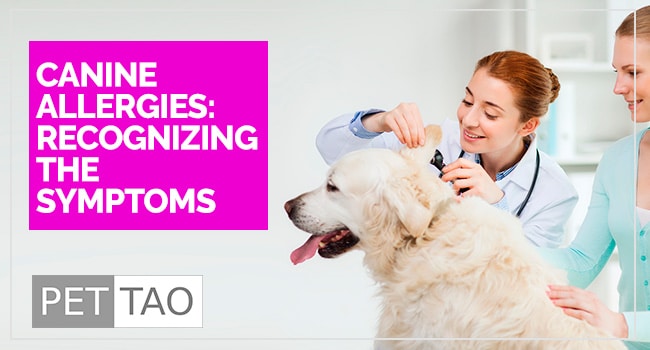Your dog itches!
“I know!” you say. “But, all dogs do!”
Dogs itch because they have allergies.
Understanding Dog Allergy Symptoms
Allergies in dogs are common.
In fact, dog itching symptoms, dog sneezing symptoms, and dog coughing symptoms due to allergies drive the business of veterinary medicine.
Most veterinarians will agree the number one reason clients seek veterinary care is because of some sort of allergy.
If allergies are so common in dogs, how do I know if my dog has allergies?
Simple! Follow the symptoms!
6 Common Symptoms of Dog Allergies
The six most common symptoms of dog allergies are:
- Itching
- Coughing
- Red, inflamed skin
- Ear infections
- Constant licking, especially the feet
- Vomiting and diarrhea
If your dog itches, gets chronic skin or ear infections, or licks his feet, your dog has allergies, period.
Now, a few other ailments could cause these signs, but practically speaking, you can bet your dog is allergic to something.
What are some other hallmark, yet less common indicators?
Allergy Indicator #1: Time of the Year!
In the spring and fall, I can honestly say 70% of the dogs I see in my practice suffer from allergies.
The environment changes dramatically in both spring and fall.
Different pollens emerge, the dust increases, and depending on the humidity, molds become active.
Additionally, fleas hawkishly seek the first blood meal out of your unsuspecting best friend.
This scenario is a recipe for a massive outbreak in your beloved dog.
This outbreak of disease we term “allergies.”
Do you suffer from hay fever? Well, dogs do too!
Sneezing, coughing and even dogs with eye drainage are all common symptoms exhibited by dogs in the spring and fall.
“What about food allergies?” You ask!
Oh, yeah!
Allergy Indicator #2: Dog Food Allergies
Dog food allergy symptoms are fairly common too!
The dog with food allergies frequently has all the signs above coupled with gastrointestinal signs – vomiting and diarrhea.
Most of the time these dogs act normal.
Yet, they itch, scratch and occasionally vomit or have diarrhea.
Food allergies are not seasonal.
Food allergic dogs exhibit signs throughout the year independent of seasonal changes.
This fact distinguishes food allergy from seasonal allergy, also called atopy.
Atopy or environmental allergies, on the other hand, occur most frequently during the spring and fall.
Food allergies are different because the food, not the environment, causes the allergic signs.
The ingredients in dog food causing food allergies are debatable.
The scientific community espouses certain proteins in the diet cause the allergies.
Corn, beef, dairy and chicken are the main instigators.
The recommendation is to change the diet to a novel protein source such as venison, bison, or rabbit.
Others claim the massive processing and over-fortification of dry dog food is the culprit.
Who knows?
The take home message is, yes, you can diagnose your dog’s allergies without a veterinarian if you follow the symptoms.
If you open your eyes and notice the symptoms, you too can “see the forest for the trees” just like your veterinarian.
Do you think your pup’s symptoms could signify allergies?
Proactive Ways to Help Your Allergic Dog
- Learn more about dog allergies.
- Switch to a Limited Ingredient Diet.
- Supplement with medicinal mushrooms. PET | TAO’s Complement Immune Mushroom Blend eases inflammatory response and ease allergy symptoms.
- Try digestive enzymes and probiotics. PET | TAO’s Harmonize Gi boosts gut health and combats food allergens.
- Feed Freeze Dried Lung Treats. According to TCVM, lung is on the same meridian as the skin. Therefore, lung treats help both breathing and skin allergies. Lung treats support lung and skin similar to a glandular supplement in a “like treats like” fashion.
- Learn more about TCVM Herbal Remedies. Chinese medicine offers many amazing natural solutions for pet allergies Some good examples are:








